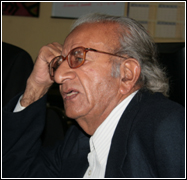


In 2007, a question was asked in the ‘O” level Cambridge International candidates: “Why Sindhi was promoted more than any other regional language between 1947 and 1988?”
Many questions are stemmed from this question: why such questions about other languages of Pakistan are not included in such papers? The question has political connotations also as in 1988 Benazir Bhutto from Sindh was at the helm of affairs in Pakistan. Though an overwhelming majority of the Pakistanis has Punjabi as their mother tongue, no questions about the Punjabi are included in Pakistan Study paper of O or A levels. It all happens since the Punjabis have totally ignored their mother tongue and surrendered it to Urdu, the national language.
In that process, they forgot the history, literature and richness of their language and even the different dialects spoken in other parts of the province are not known to them. Now Seraiki (a word never used for the dialect spoken in southern Punjab before 1960) is a separate language from Punjabi and the writers from the south consider all the poets from the central and northern Punjab Seraiki poets only to establish their identity. They dub Bulleh Shah from Kasur, Shah Husain from Lahore, Hafiz Barkhurdar from Gujranwala, Shah Murad from Chakwal, Sultan Bahu from Jhang, Nijabat from Sargodha and Baba Farid from Pakpattan as Seariki poets. If they are Seraiki poets, where are the Punjabi poets? Certainly not those from the other side of the Jamuna!
Only because of the anti-Punjabi attitude of successive Punjab governments, Seraiki is being promoted as a different language.
The top poet of Seraiki is presented Khwaja Farid and surprisingly Khwaja in his life presented himself as a Punjabi poet as he followed the poetic traditions set by Shah Husain of Lahore and Bulleh Shah of Kasur i.e Kafi. Another important factor is that in his record of daily activities published under the title of ‘Maqabeesul Majalis’, Khawaja mainly mentions the names and poetry of Punjabi poets like Bulleh Shah, Shah Husain and Ali Haider. He does nit mention any Hindi, Sindhi or Urdu poets in the book.
These problems started when the British dropped Punjabi and made Urdu as official as well as classroom language. This can be best judged in ‘Linguistic Imperialism’ a book of Robert Phillipson. This has been quoted in an article by Dr Nasir Abbas Nayyar, Language in the context of colonialism and linguistic imperialism, published in the latest issue of ‘Urdu Akhbar’, an organ of the National Language Authority now being chaired by Multan-based scholar Prof Anwar Ahmad. It says…. “The dominance of English is asserted and maintained by the establishment and continuous reconstruction of structural and cultural inequalities between English and other languages…. Structural refers broadly to material properties (for example, institutions, financial allocation) and cultural to immaterial or ideological properties (for example attitudes, pedagogic principles)…..”
The relationship the British had established between English and other languages like Urdu and Bengali, has been kept by the Pakistani establishment between Urdu and other languages. For instance, the Bengalis were in majority and they in good faith gave their sizable representation in the central assembly to League leaders such as prime minister Liaqat Ali Khan, Shabbir Ahmad Usmani, Dr Mahmood Husain, Prof Ishtiaq Husain Qureshi and one Punjabi Ghulam Muhammad. But all of them turned hostile to Bengali when the Bengalis demanded a better place for their language. To counter the demand of the Bengalis, Liaqat Ali Khan presented Urdu as the only Islamic language and representative of all the Muslims of the subcontinent. Baba-i-Urdu Maulvi Abdul Haq even went to such an extent that Urdu was the only Islamic language of Pakistan while all other languages of Pakistan were of the infidels.
One wonders that educationists Dr Mahmood Husain and Dr Ishtiaq Husain Qureshi elected from East Pakistan also sided with Liaqat Ali Khan on the language issue. Both of them remained deputy ministers for education in the federal cabinet. Even Maulana Shabbir Ahmad Usmani who knew that Islam in the subcontinent was spread through local languages and not Urdu, also supported Urdu. Ghulam Muhammad, being a Punjabi but without any formal education in Punjabi, was just a bureaucrat.
What the Urduwalas did with Bengali, Sindhi and other languages is a very sad story and a repetition of what Robert Phillipson has said in ‘Linguistic Imperialism’.
The most unfortunate story is that even Urdu, according to constitutional requirements, has not been given its due status. It is high time that Punjabi be introduced as the medium of instruction. English has not vacated the place for Urdu and Urdu immorally occupies the place of Punjabi. This deprivation of a Punjabi child since 1947 emerged as a horrible political problem and now the largest province of the country is being targeted on linguistic basis by the feudal of the Punjab, particularly from the south, Sindh, Balochistan and the Pukhtunkhwa to be brief Punjabi language is victim of Linguistic Imperialism.
Curtsey: DAWN.COM Published 2011-08-23
Send email to nazeerkahut@punjabics.com with questions, comment or suggestions
Punjabics is a literary, non-profit and non-Political, non-affiliated organization
Punjabics.com @ Copyright 2008 - 2018 Punjabics.Com All Rights Reserved
Website Design & SEO by Webpagetime.com